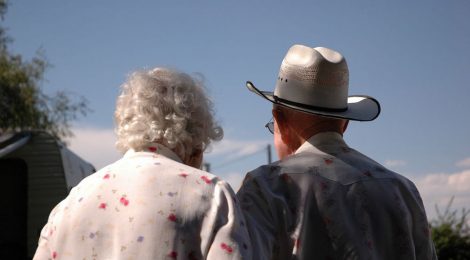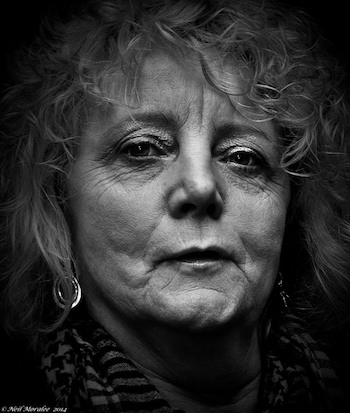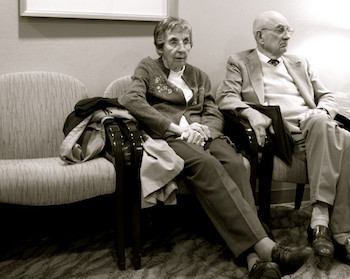
Caring for a Loved One with Alzheimer’s Brings Surprising Benefits
“I’m always in the present. I have to be one step ahead of David. Things go missing all the time in this house—the remote, mail and even the utensils. I’m down to a handful of forks! It would be simple if I could just lock the door to store some important items, but he doesn’t like that.”
Mary (name changed for anonymity) is the primary caregiver for David, her husband of 50 years who is in the final stages of Alzheimer’s disease. For Mary, ‘being in the present’ refers to her constant worry about even the most mundane elements of life that many take for granted.

Recent estimates show that over 5 million Americans are living with Alzheimer’s—a number expected to rise to as high as 16 million by 2050. Currently more than 15 million Americans function as primary caregivers and provide essential, albeit unpaid care for people with Alzheimer’s and other dementia-related illnesses, taking on responsibilities such as bathing, grooming, dressing, feeding, and providing additional daily living assistance. At times, caregivers may even have to manage unexpected and unprovoked acts of violence, paranoia, and inappropriate sexual behaviours. Mary understands this reality all too well. In an interview with the Trauma and Mental Health Report she confirms this additional stress:
“I take David everywhere I go. I’m always scared that he will do something unpredictable, embarrassing and grossly inappropriate.”
This demanding and overwhelming role can take an emotional toll, putting caregivers at risk of becoming socially isolated, exhausted, and suffering from burnout. It is clear that there are drawbacks to being a primary caregiver and Mary has experienced many of them, such as loneliness, guilt, embarrassment, frustration, and even verbal and physical abuse. Mary and many individuals in similar circumstances, continue to do so at the expense of their own wellbeing.
But a growing body of research shows that despite challenges, there are positive aspects associated with providing such care for another person. Studies report that some experience an enhanced sense of meaning in their lives, while others feel a sense of empowerment as they learn how to navigate the health and social systems related to the illness. Caregivers have also been found to frequently reminisce on happy memories, enjoy pleasurable activities, and develop a deeper appreciation for time spent with their loved ones.
When reflecting on their life and their current situation, many of the positive benefits of caregiving resonate with Mary:
“Throughout our marriage, we lived separate lives. At times, I resented David because he would often leave me to go play golf. I felt a distance between us. Now our situation has forced me to spend time with him and in some ways, I’m getting what I longed for. I’ve become closer to family members who have assisted me with David’s care for which I am so grateful. You truly learn who is there for you.”
In addition to gaining a deeper appreciation for her family, Mary acknowledges that she has also grown substantially as an individual:
“I have become more patient and have learned to effectively de-escalate situations. I am confident I can handle a lot more than I could before.”
Speaking with her, it is evident that Mary has come to appreciate the little things in life:
“Despite our daily struggles, there are precious moments; moments when I see glimpses into his soul. Some days when I pick him up from the nursing home, he is eagerly waiting for me by the window. I’m sure he thinks that I’m solely his caregiver. But, I can see his vulnerability and I know that he needs me.”

Many factors appear to influence caregiver resilience: the intensity and context of the provided care, socio-demographics such as age, gender, education, the availability of social and community resources, and the caregiver’s psychological attributes. Though Mary fully acknowledges the struggles and stresses that come with her role caring for David, she remains resilient. And no matter how difficult her situation may get, she stays focused on the gifts this experience has brought her.
-Young Cho, Contributing Writer
Image Credits
Feature: Edwin & Kelly Tofslie at Flickr, Creative Commons
First: Neil Moralee at Flickr, Creative Commons
Second: John Starnes at Flickr, Creative Commons




Great post! I helped take care of my grandma for a few months, she has Alzheimer. Its a sad disease that can slowly take someone away from you and it is hard as a caregiver to stay connected with the world when you are helping someone else 24/7. I was able to help my grandma with many things including getting a supplemental medicare plan through Insurance Line One. I do agree though even though it is hard, there are precious moments.(https://www.insurancelineone.com)